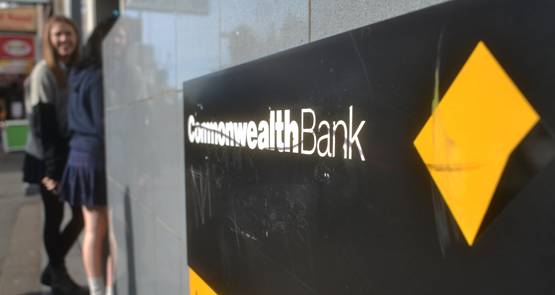
If you want to see the yawning chasm between US and Australian corporate regulators, look no further than the contrasting fates of Wells Fargo and the Commonwealth Bank today.
The Commonwealth Bank’s interim results show that the Austrac scandal, greater regulation and heavier macro-prudential controls on lending have had zero negative impact on its profits — indeed, might have bolstered them. The $375 million estimate from the bank for the cost of the Austrac case, and $200 million in costs for “remediation”, is a pin prick. And the government’s new (the legislation was passed today by the Senate) banking executive accountability regime, or BEAR, won’t apply retrospectively. Sure, there’s a royal commission lumbering into action (at a decidedly slower pace than the trade union royal commission got up and running — funny that) but that’s limited to a year and the whole thing is designed to minimise the potential reputational damage to the banks.
Compare and contrast what the US Federal Reserve has just done to Wells Fargo, America’s third biggest bank by assets (US$1.95 trillion). The Fed threw the regulatory book at Wells Fargo for its fake account scandal, in which staff had created millions of fake accounts designed to rip off unknowing customers. The Fed skipped a fine, and instead froze Wells Fargo’s balance sheet for at least a year, and ordered the bank to sack four more directors, on top of the two, plus the chair and CEO, who have already been removed. The bank will be able to continue current activities including accepting customer deposits or making consumer loans, but for every dollar of new assets it takes on, it will have to shed the same amount from its balance sheet. It is the harshest punishment of a big US bank since the great Savings and Loan scandals of the 1980s, which resulted in jailed executives, and banks ordered to be shut down.
The financial pain from the Fed’s action will be felt for some time. Warren Buffett’s Berkshire Hathaway — which has close links with the bank — is the largest shareholder in Wells, even though it has downgraded its importance to his core portfolio (which includes Apple and Coca-Cola) after the Fed refused his attempt to move past 10%. As it turned out, that refusal spared St Warren of Berkshire some substantial losses in recent days as the sharemarket crash and the Fed ripped 13% off the bank’s share price.
While much has been made in the US or the failure of bankers responsible for the financial crisis to ever see the inside of a jail cell, its corporate regulators are an altogether tougher breed than any found in Australia. We’re still waiting to hear what action ASIC is going to take against Rio Tinto and its former executives, who are facing charges from the US Securities and Exchange Commission over a multibillion-dollar Mozambique write-down. Stung by questions about why US and British regulators had already gone after the likes of former CEO Tom “sovereign risk” Albanese while ASIC had (as usual) done nothing, in October outgoing ASIC head Greg Medcraft said “watch this space”.
In the intervening three months, zip.
Culture, risk and accountability were key questions at Wells Fargo, which the board and senior management skated over, ignored or shaped to suit themselves. The board and senior management are paying the price for those profound cultural problems. Here, what does the CBA face? An APRA panel of inquiry. They’ll be shaking in their Aquilas.









As far as the penalties for Wells Fargo, the financial hit will hurt the company, but I’m sure those responsible won’t pay a dime. They should go to jail.
But I guess the US has one of those deferred prosecution rules for executives.
‘…shaking in their Aquilas.’
You must be joking, those at the top of the CBA heap will be wearing Gucci or J M Weston. And they’ll probably be shaking with suppressed mirth.
The US interrogation of Wells Fargo execs was fortunate to have firebrand Elizabeth Warren (Dem, Massachusetts) putting the suits under the griller. She didn’t hold back or mince words, it was a joy to watch those scoundrels sweat as she insisted they answer. The execs were left wide-eyed, speechless…& their silence was damning.
I hope Crikey will be active in reporting on the Royal Commission. The initial actions by the Commission has all the makings of a whitewash and Judge Hayne needs a few more Commissioners. The Banking Royal Commission in the 1930’s had Ben Chifley – maybe Paul Keating could get a run?
Oh yes please.